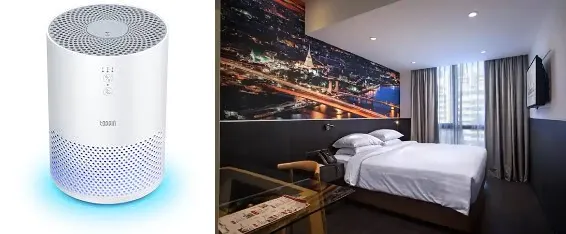
Does air purifier cool the room? Things we know
Have trouble sleeping at night because the air conditioner keeps blowing cold air into your bedroom? Did you know that even high-end air purifiers won’t improve the quality of the air in your home? In this video, we’ll share some facts about air conditioning and explain why you should trust your filterless air purifier.
Already, you are familiar with Air purifiers that which are great devices for removing allergens from the air. They can also filter out pollutants, such as tobacco smoke and pet dander. But does an air purifier cool the room?
Air-conditioners work by running refrigerant through coils inside the unit. These coils absorb heat from the indoor air during cooling mode and emit heat back into the air during heating mode. This system allows you to control the temperature in your home or office space.
However, having an air conditioner also means that your home will produce more carbon dioxide (CO2) and other pollutants. The average air conditioner filters out around 5% of these particles. Thus, installing a top-of-the-line air-purifying device might only marginally reduce the number of toxins in your home.
Does an air purifier help with a hot room?

Yes, it does. But this depends upon what type of air purifier you use as well as how it is installed. For example, a HEPA filter will not cleanse indoor air by creating negative pressure (as fans do). Instead, it works by trapping microscopic particles known as bacteria, dust, pollen, etc., inside its porous structure. These particles are then removed from the air when you turn off your system
Now that you know already that air purifiers can cool the room, what if they can’t cool the room, does it mean you can use it alongside a fan? Let’s further see
Can I use an air purifier with a fan?
Yes! You can Both an air purifier and fan at the same time. However, we recommend using a high-quality air purifier that has been tested and certified for indoor use. If you have a space that can endure a certain amount of dust (eg. a closet), then an air purifier that doesn’t run continuously is fine.
Also, know that an air purifier can run 24/7 while a fan runs only when needed. However, if your air purifier has a switch that automatically shuts off after some time of not using it, then this may cause problems to your system (such as drying out). You can always manually turn off the fan, but having the air purifier shut off would be ideal.
If you are unsure whether your air purifier runs continuously or just turns on when needed, check the device manually. But is there any benefit to having a fan and purifier together?
Why should you buy an air purifier with fans?
Air Purifiers can remove harmful gasses like VOCs that are created from regular indoor air conditions. These are often linked to allergies, asthma, and other respiratory issues. If you have these problems inside your home, they will likely affect your family members as well. The best way to keep this problem at bay is to install an air purifier with effective fans.
The fans here are designed to circulate the air inside your house, ensuring that no stagnant areas remain where the VOCs can collect. This means that any allergens that are present will not accumulate in places where they could cause severe harm.
In addition, if you have small children, pets, or even adults who suffer from chronic illnesses, then you need to make sure that the air purification system is safe and has sufficient filters to ensure their health.
In this case, it’s fine to use both devices together as they offer different functions. If you are looking for a high-quality filter, then I would recommend considering one that has a built-in fan.
These kinds of filters have been proven over time to keep the airflow going while reducing the amount of dust being blown around. They are easy to install and remove and typically don’t require an adapter to fit the existing fan.
Which filters work best? Which ones don’t?
Filters are important to any water filtration system. They keep out contaminants that would otherwise damage your pipes, pumps, and other parts of your home’s plumbing system.
That said, different filter materials have their advantages and disadvantages. Here are some things to consider before you purchase a water filter.
First, what kind of filtering system do you need? There are two types of water filters: gravity-fed and pressure-fed. Gravity-fed systems use gravity to move water through a filter media. This can be done with a simple funnel design that allows water to flow from a container into the filter.
Pressure-fed systems use a pump to force the water through the filter media. These filters require a bit more maintenance than gravity-fed systems, but they give much better results.
Next, where does the water come from? If yours comes from a municipal supply, you can likely get by without replacing your filters. However, if you live somewhere with hard water (high levels of minerals), you’ll want to take care of this sooner rather than later.
Hard water can cause corrosion problems, making your pipe components brittle and prone to breaking. It can also leave deposits that block pipes and make them harder to clean.
Finally, how often should you change your filters? When purchasing a new filter, you’ll want to look at its manufacturer’s recommendations. You may find that a certain brand recommends changing your filter every three months, while others recommend changing theirs every six months.
Some brands even offer lifetime warranties. As long as you’re not using chemical treatments or additives to treat algae or bacteria, you shouldn’t have to replace your filters too frequently.
Do air purifiers make the room smell better?

There are many different types of air purifiers out there, but only a few offer any real benefits. Some people even claim that an air purifier makes their house smell worse! That’s probably because of the filters that these devices use.
They’re designed to filter particles from the airflow, like dust and allergens, and remove odours. The problem is that when you’re using them indoors, the particles aren’t going anywhere. So while you may think that your house looks cleaner, you’re not getting any cleaner air.
Now that you’ve learnt about the benefits of having an air purifier and fan combo, is there any downside to using an air filter with a fan?
Are there any downsides to using an air filter with a fan?
The first drawback is noise. These units are loud, making them inappropriate in areas where people should be able to sleep soundly without being disturbed by noisy devices. Additionally, some fans generate enough noise that they could cause hearing damage in the long term.
The second downside is the fact that these units usually only work in a single direction. If you set them up facing a window, then you won’t be able to use them at night to remove smoke and other airborne particulates from outside of the room. This means they’d just be collecting dust particles instead of the smaller particles that you want.
The third downside is power consumption. The fan draws 120watts right off your wall plug. If you’re not careful, you can easily use over 100 watts, making this setup a major drain on electricity. To avoid this, keep track of how much power you’re consuming via your energy bill and switch out filters only after they’ve had their full lifespan.
Another drawback is keeping them clean. Because there’s no filter in between the fan and the air, dust particles from outside can get into the fan blades and cause them to wear. A simple way to prevent this is to cover the top of the fan with duct tape. This makes it difficult for dirt particles to enter and will help to extend the life of the fan.
And lastly, a fan-powered unit cannot capture odours. Because of this, you’ll need to leave the windows open while using the device, increasing the amount of heat in your home.
Aside from those mentioned, As long as your fan has been designed properly, there are no sides to using it. But if you want to increase airflow, make sure that you have at least 1/4 inch of clearance between the top of the fan and the top of the cabinet. And don’t for a get about the exhaust! You might notice that some fans come with filters built-in, but they aren’t necessary unless your fan number has sufficient flow low capacity.
Conclusion: does air purifier cool the room?
In conclusion, athough air purifiers may not provide as much cooling as fans, they’ll still keep your house cooler than it would be without one. So don’t neglect this great investment! Plus you can use air purifier and fan at the same time.
Also, using an air purifier to cool down the room will save you money and reduce the amount of chemicals coming into the air that is harmful to your health check out the fact that they can with allergies and makes home smells better.
So when looking for an air purifier, consider what you’re trying to accomplish. Do you want to remove smells? Are you concerned about pollen allergy? Or perhaps you just want to give your house a cleaner feel?
Whatever your goals may be, look through our guide and find the best one for your needs. In this case, I recommend you check out the cold air purifier comparison.
